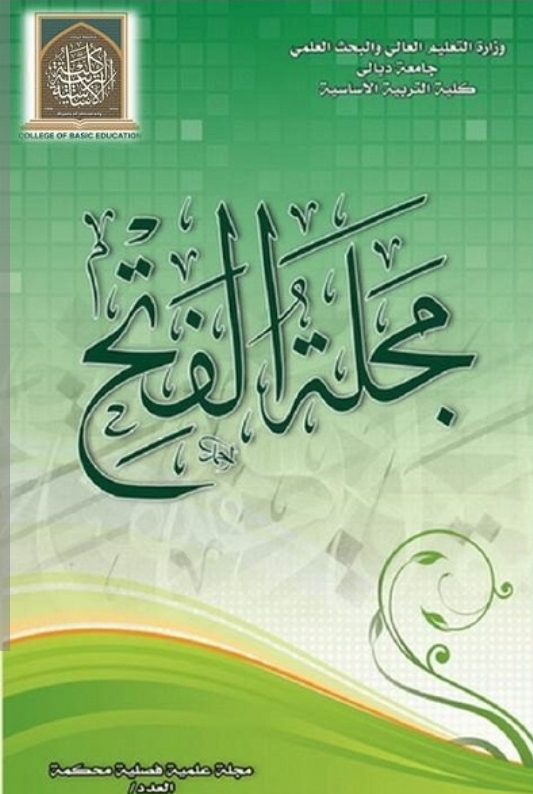التفكير الوجودي لدى موظفي دور الدولة
الكلمات المفتاحية:
التفكير الوجودي، موظفو دور الدولة، سنين الخدمةالملخص
يهدف البحث الحالي إلى:
- قياس التفكير الوجودي (Existential Thinking) لدى موظفي دور الدولة.
- الموازنة في الفروق على وفق متغير النوع (ذكور، إناث).
- الموازنة في الفروق على وفق متغير سنين الخدمة (عشر سنوات فأقل، أكثر من عشر سنوات).
وتوصل إلى أنَّ:
- موظفي دور الدولة يتسمون بالتفكير الوجودي.
- الفروق في التفكير الوجودي على وفق متغير النوع ليست بذات دلالة إحصائية، وكذلك متغير سنين الخدمة.
اعتمد الباحث مستوى دلالة (0,05)، وخرج الباحث بعدد من التوصيات والمقترحات.
المراجع
- السنيدي، خالد بن عبد العزيز سليمان، (2013)، التشوهات المعرفية وعلاقتها بسمة الانبساط والانطواء لدى متعاطي المخدرات، والمتعافين منه، رسالة ماجستير غير منشورة، قسم العلوم الاجتماعية والنفسية، جامعة نايف العربية للعلوم الأمنية، السعودية.
- السواط، وصل الله بن عبد الله حمدان، (2008)، فاعلية برنامج إرشادي معرفي سلوكي في تحسين مستوى النضج المهني وتنمية مهارة اتخاذ القرار المهني لدى طلاب الصف الأول الثانوي بمحافظة الطائف، أطروحة دكتوراه غير منشورة، كلية التربية، جامعة أم القرى، السعودية.
- عبد الباسط، (2017)، تدريس مهارة الكلام في ضوء نظرية الذكاءات المتعددة (بالتطبيق على تلاميذ مدرسة أناك صالح الابتدائية مالانج جاوى شرقية)، الجامعة الإسلامية الحكومية مولانا مالك إبراهيم مالانج، مجلة التعريب، المجلد (5)، العدد (2).
- Allan, Blake A., and Shearer, C. Branton, (2012), The Scale for Existential Thinking, International Journal of Transpersonal Studies, 31(l), pp. 21-37.
- Beck. A.T. (1967), Depression: Causes and Treatment, Philadelphia, University of Pennsylvania Press.
- Cour, P., & Hvidt, N. C. (2010). Research on meaning-making and health in secular society: Secular, spiritual and religious existential orientations. Social Science and Medicine, 71(7), 1292-1299.
- Frias, A., Watkins, P. C., Webber, A. C., & Froh, J. J. (2011). Death and gratitude: Death reflection enhances gratitude. Journal of Positive Psychology, 6(2), 154-162.
- Gardner, H. (1999). Intelligence reframed: Multiple intelligences for the 21st century. New York, NY: Basic Books.
- Gardner, H. (2004). Frames of mind: The theory of multiple intelligences. New York, NY: Basic Books. (Original work published 1983)
- Gunawan, Adi W. (2004), Genius Learning Strategy: Petunjuk Praktis untuk Menerapkan, Majemuk:Teori dalam Praktek. Batam: Interaksara.
- Hartelius, G., Caplan, M., & Rardin, M. A. (2007). Transpersonal psychology: Defining the past, divining the future. The Humanistic Psychologist, 35(2), 1-26.
- Shearer, B. (2005), Development and Validation of a Scale for Existential Thinking, Unpublished Paper, Presented at the Annual Meeting of the Research Association, Multiple Intelligence SIG: Montreal.
- Spinelli, E.(2005). The interpreted world: An introduction to phenomenological Psychology. Thousand Oaks, CA: Sage.
- Steger, M. F., Frazier, P., Oishi, S., & Kaler, M. (2006). The Meaning in Life Questionnaire: Assessing the Presence of and Search for Meaning in Life. Journal of Counseling Psychology, 53(1), 80-93.
- Steger, M. F., Mann, J. R., Michels, P., & Cooper, T. C. (2009). Meaning in Life, Anxiety, Depression, and General health among smoking cessation patients. Journal of Psychosomatic Research, 67(4), 353-358.
- Sujiono, Yuliani Nurani dan Bambang Sujiono, (2010), Bermain Kreatif Berbasis Kecerdasan, Anak Sejak Usia Dini. Jakarta: Grasindo.
- Taubman-Ben-Ari, O. (2011). Is the Meaning of Life also the Meaning of Death? A Terror Management Perspective Reply. Journal of Happiness Studies, 12(3), 385-399.
- Yalom, I.D. (1980), Existential Psychotherapy, New York, NY: Basic Books.
التنزيلات
منشور
كيفية الاقتباس
إصدار
القسم
الرخصة
الحقوق الفكرية (c) 2023 مجلة الفتح للبحوث التربوية والنفسية

هذا العمل مرخص بموجب Creative Commons Attribution 4.0 International License.
حقوق النشر والترخيص
تطبق مجلة الفتح للبحوث التربوية والنفسية ترخيص CC BY (ترخيص Creative Commons Attribution 4.0 International). يسمح هذا الترخيص للمؤلفين بالاحتفاظ بملكية حقوق الطبع والنشر لأوراقهم. لكن هذا الترخيص يسمح لأي مستخدم بتنزيل المقالة وطباعتها واستخراجها وإعادة استخدامها وأرشفتها وتوزيعها ، طالما تم منح الائتمان المناسب للمؤلفين ومصدر العمل. يضمن الترخيص أن المقالة ستكون متاحة على نطاق واسع بقدر الإمكان وأن المقالة يمكن تضمينها في أي أرشيف علمي.
لمزيد من المعلومات، يرجى متابعة الرابط: https://creativecommons.org/licenses/by/4.0/.


